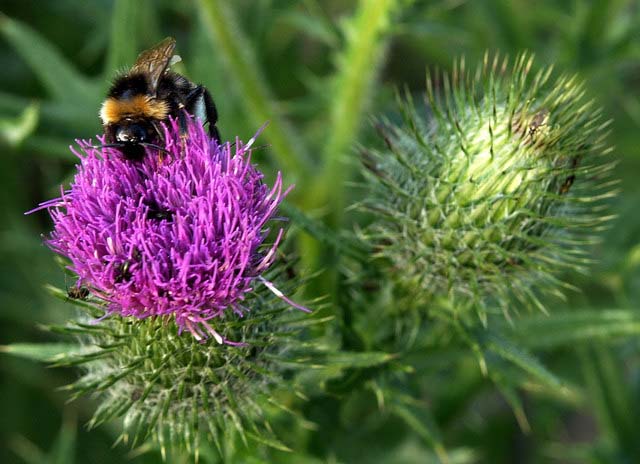
In 2009 it was estimated that services provided by pollinators are worth an annual £510m in crops to the UK. That's why declines in many insect pollinator populations are a worry for economists and politicians as much as ecologists.
Take the bumblebee: the number of species has declined across Europe in the last 60 years and in Britain at least two species are thought to have gone extinct. Many other specialist pollinators are threatened and no one knows what effect this will have on overall pollination services.
There have been many theories about what's causing the decline and how we might halt it: recently insecticides called neonicotinoids have been suggested as a prime suspect but parasitic mites (Varroa destructor) and fungal disease (Nosema ceranae) have also been in the frame, not to mention the widespread destruction of pollinator-friendly habitats, such as wildflower meadows.
At an event in the Houses of Parliament this afternoon, UK politicians can find out about the current evidence concerning pollinator decline and what might be done to stop it. The event and accompanying POSTnote are the work of Rory O'Connor, a DPhil student at Oxford University's Department of Zoology and the NERC Centre for Ecology and Hydrology.
'The idea of POSTnotes is that they are an unbiased source of the best information about a topic and explain the science in a clear and understandable way,' Rory tells me. 'This is challenging when it comes to pollinator decline as there are opposing views, with neonicotinoids being a particularly controversial issue. What I had to do was go back through all the scientific evidence, summarise it, and then present it in just four pages.'
One of the big problems is how much we still don't know about pollinator populations. 'How do you monitor insect pollinator populations effectively? Which pollinators provide pollination services to which crops or wildflowers? In a lot of cases we don't know,' Rory explains. 'There's already some ongoing research into this but it's still early days and it's a fast-changing area, but then this is part of what makes it exciting to investigate!'
Rory's usual area of study is butterflies, so branching out to research a wide range of pollinators was quite a departure. The opportunity to work in Westminster came when he was awarded a British Ecological Society Fellowship at POST.
The event and publication of the note marks the end of his Fellowship but Rory comments that he's learnt a lot from it: 'My writing has improved, as has my analytical thinking and ability to synthesise a lot of complicated information – all particularly useful skills to hone for when I'm writing up my thesis. The simple but important things, like my confidence in asking questions and talking to people about my work and ideas, have also improved. I've also learnt a lot about the tremendously important world of insect pollinators.'
So what have we learnt about how to save the bees?
As well as the need to improve our fundamental knowledge of the role of insect pollinators and monitoring populations, the evidence Rory has gathered suggests that conserving and creating pollinator-friendly habitats could be crucial in providing refuges for at-risk species to feed and nest.
One answer could be to build on and extend current initiatives such as the UK government's 12 Nature Improvement Areas, Wildlife Trust's Living Landscapes, and the B-Lines project in Yorkshire, where farmers create corridors linking pollinator habitats. England's 402,000 km of hedgerows could also be used to provide new habitats.
Let's hope that the Westminster hive-mind can find an answer to the question of how to protect such valuable and productive insect species.
